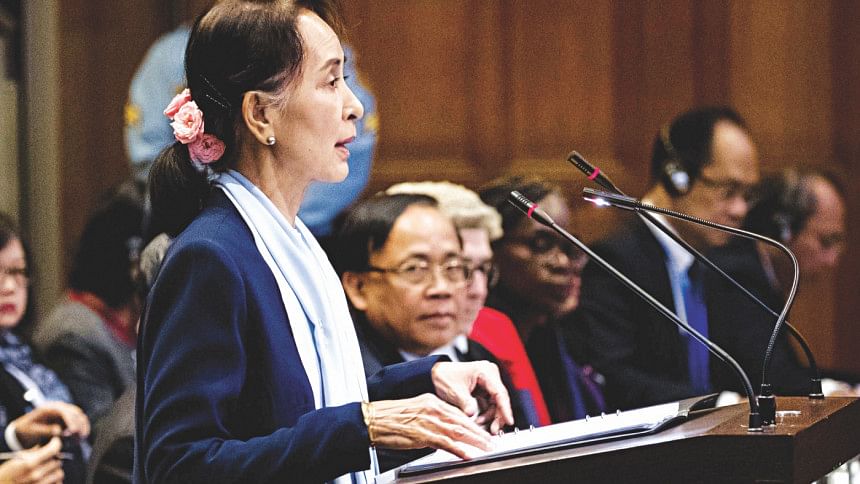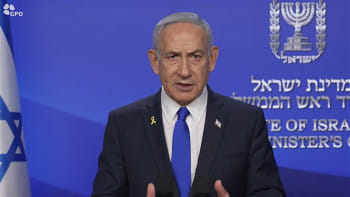Defiant Suu Kyi in denial

“Genocidal intent cannot be the only hypothesis.”
AUNG SAN SUU KYI
“Multiple independent agencies and experts, as well as Rohingya themselves, have documented mass killings, widespread rape, and wholesale destruction of land and property intentionally inflicted on innocent civilians. The government has discriminated against the Rohingya for decades. This is genocide and it’s precisely what the Genocide Convention set out to prevent.”
AKILA RADHAKRISHNAN, GLOBAL JUSTICE CENTRE PRESIDENT
Myanmar civilian leader Aung San Suu Kyi defended her government from accusations of genocide against the Rohingya community at the United Nation’s top court yesterday, calling the allegations “incomplete and misleading.”
Addressing the International Court of Justice (ICJ) at the Peace Palace in the Netherlands, the Nobel Peace Prize winner said “genocidal intent cannot be the only hypothesis” regarding the Myanmar military’s operations in Rakhine State in the summer of 2017.
More than 740,000 Rohingyas fled into neighbouring Bangladesh in 2016 and 2017 during the ensuing violence. Survivors have recounted harrowing atrocities including gang-rape, mass killings, torture and widespread destruction of property at the hands of the Myanmar army.
The violence has been described as genocide by a UN fact-finding commission.
The ICJ case is the first international legal attempt to hold Myanmar accountable for the Rohingya crisis. Based in The Hague, the 17 judges of the ICJ are tasked in part with settling legal disputes between states.
Suu Kyi is leading a delegation representing Myanmar at the ICJ responding to allegations brought by the tiny African nation of Gambia that Myanmar, also known as Burma, committed “genocidal acts” that “were intended to destroy the Rohingya as a group” through mass murder, rape, and destruction of communities.
Her main argument rested on the premise that the country was dealing with an armed conflict in Rakhine that was challenging the “sovereignty and security of Myanmar.”
Myanmar defence forces were responding to “coordinated and targeted” attacks on villages and police outposts from a Rohingya insurgent group called the Arakan Rohingya Salvation Army (ARSA), she said.
She characterised those “clearance operations” by the military as legitimate counter terror operations against the ARSA.
However, Suu Kyi did not address the alleged atrocities laid out by the Gambian delegation in the opening hearings on Tuesday, admitting only that “disproportionate force” could not be ruled out in some cases, or that the military “didn’t distinguish clearly enough between ARSA fighters and civilians.”
Suu Kyi also told the court that Myanmar’s own independent investigators had the capacity to investigate and if war crimes or human rights abuses were committed by the military or civilians, “they will be prosecuted.”
Only seven soldiers have ever been prosecuted on charges relating to the Rohingya crisis. They served less than one year of a ten-year sentence for the killing of 10 Rohingya men and boys in the village of Inn Din.
“Can there be genocidal intent on the part of the state that actively investigates?” she asked.
Following the presentation, the Global Justice Centre said the picture Suu Kyi built up of an “internal military conflict with no genocidal intent” was “completely false.”
“Multiple independent agencies and experts, as well as Rohingya themselves, have documented mass killings, widespread rape, and wholesale destruction of land and property intentionally inflicted on innocent civilians. The government has discriminated against the Rohingya for decades. This is genocide and it’s precisely what the Genocide Convention set out to prevent,” Akila Radhakrishnan, Global Justice Centre president, said in a statement.
Many in the international community have questioned how a Nobel laureate renowned for fighting for democracy and human rights is now justifying her government’s persecution of the Muslim minority.
Yanghee Lee, the UN Special Rapporteur on human rights in Myanmar, told CNN before the hearings yesterday that ever since Suu Kyi’s party the National League for Democracy came to power after winning landslide elections in 2015, she has been “singing from a different song sheet.”
‘A GREAT LIAR’
The case is being followed closely across Rakhine State’s border in Bangladesh, where more than 1 million Rohingya are now crowded into the world’s biggest refugee camp.
Yesterday, some refugees shouted “liar, liar, shame!”, as they watched Suu Kyi defend Myanmar’s case on television, reports Reuters.
“She is a liar. A great liar, shame on her,” said Abdur Rahim, 52, while watching a live telecast of her testimony at a community centre in the Kutupalong camp.
Meanwhile, in Myanmar’s commercial capital Yangon, where there have been demonstrations in support of Suu Kyi in recent days, several hundred people, including monks and government staff, watched a live broadcast of the hearings in a park. Some recorded her comments on their phones.
Suu Kyi was on the side of the generals when she opened the majority-Buddhist nation’s defence at the ICJ.
“Regrettably, The Gambia has placed before the court a misleading and incomplete picture of the situation in Rakhine state,” said the Myanmar leader, wearing traditional Burmese dress and flowers in her hair.
Addressing judges in the wood-panelled courtroom, the 74-year-old said Myanmar was dealing with an “internal armed conflict” in the southwestern state where the alleged atrocities took place.
“We are dealing with an internal armed conflict, started by coordinated and comprehensive attacks by the Arakan Rohingya Salvation Army, to which Myanmar’s defence services responded,” she told the court.
“Tragically, this armed conflict led to the exodus of several hundred thousand Muslims from the three northernmost townships of Rakhine into Bangladesh -- just as the armed conflict in Croatia with which the court had to deal led to the massive exodus of first ethnic Croats and later ethnic Serbs.”
Under the rules of the ICJ, member states can initiate actions against fellow member states over disputes alleging breaches of international law – in this case, the 1948 convention on the prevention and punishment of the crime of genocide.
Suu Kyi disputed the genocide convention as a basis for the case and asserted in court that the principle of international law is that it should compliment domestic justice.
She said if war crimes or human rights violations had been committed they would be dealt with by Myanmar’s justice system, adding that in one case soldiers had been punished for the execution of civilians.
“There will be no tolerance of human rights violations in Rakhine or elsewhere in Myanmar,” she said. “No stone has been left unturned to make domestic accountability work…
“Please bear in mind this complex situation and the challenge to sovereignty and security in our country when you are assessing the intent of those who attempted to deal with the rebellion.
“Surely under the circumstances genocidal intent cannot be the only hypothesis.”
One of the lawyers representing Myanmar, Prof William Schabas of Middlesex University, said the Gambia had not addressed an intent to conduct genocide or stated the number of victims, writes The Guardian.
UN investigators last year concluded that Myanmar’s treatment of the Rohingya amounted to genocide while rights groups have detailed a catalogue of alleged abuses.
The Gambia filed an application in November accusing Myanmar of breaching the 1948 genocide convention and asking the court to take emergency measures to stop further violence.
A day after sitting through hours of graphic accounts of violence read out by The Gambia’s lawyers, Suu Kyi admitted there may have been civilian casualties including some killed when a helicopter opened fire.
But she argued these were an inevitable part of the conflict.
Myanmar was undertaking its own investigations and “if war crimes have been committed”, then its justice system would deal with them, she added.
Suu Kyi said the court, set up in 1946 to rule on disputes between member states, had not confirmed genocide in cases of mass expulsions of civilians in the 1990s Balkans war.
Lawyers for Myanmar also zeroed in on what they said was the lack of proof of “genocidal intent”, which is notoriously difficult to prove in international law.

 For all latest news, follow The Daily Star's Google News channel.
For all latest news, follow The Daily Star's Google News channel. 



Comments